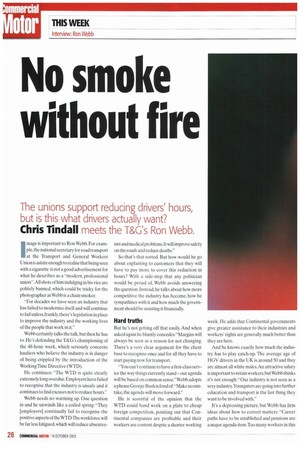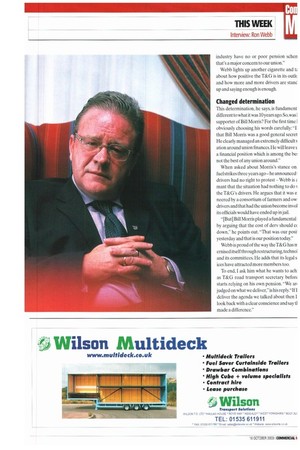No smoke without fire
Page 26

Page 27

If you've noticed an error in this article please click here to report it so we can fix it.
The unions support reducing drivers' hours, but is this what drivers actually want? Chris Tindall meets the T&G's Ron Webb.
Image is important to Ron Webb. For example. the national secretary for road transport at the Transport and General Workers Union is astute enough to realise that being seen with a cigarette is not a good advertisement for what he describes as a -modern, professional union". All shots of him indulging in his vice are politely banned, which could be tricky for the photographer as Webb is a chain smoker.
"For decades we have seen an industry that has failed to modernise itself and will continue to fail unless. frankly. there's legislation in place to improve the industry and the working lives of the people that work in it."
Webb certainly talks the talk, but then he has to. He's defending the T&G's championing of the 48-hour week, which seriously concerns hauliers who believe the industry is in danger of being crippled by the introduction of the WorkingTime Directive (WTD).
He continues: "The WTD is quite clearly extremely long overdue. Employers have failed to recognise that the industry is unsafe and it continues to find excuses not to reduce hours."
Webb needs no warming up. One question in and he unwinds like a coiled spring: "They [employers] continually fail to recognise the positive aspects of the WTD.The workforce will be far less fatigued, which will reduce absentee ism and medical problems It will improve safety on the roads and reduce deaths."
So that's that sorted. But how would he go about explaining to customers that they will have to pay more to cover this reduction in hours? With a side-step that any politician would be proud of. Webb avoids answering the question. Instead, he talks about how more competitive the industry has become, how he sympathises with it and how much the government should be assisting it financially.
Hard truths But he's not getting off that easily. And when asked again he bluntly concedes: "Margins will always be seen as a reason for not changing. There's a very clear argument for the client base to recognise once and for all they have to start paying now for transport.
"You can't continue to have a first-class service the way things currently stand— our agenda will be based on common sense.-Webb adopts a phrase George Bush is fond of:-Make no mistake, the agenda will move forward."
He is scornful of the opinion that the WTD could hand work on a plate to cheap foreign competition. pointing out that Continental companies are profitable and their workers are content despite a shorter working week. He adds that Continental governments give greater assistance to their industries and workers' rights are generally much better than they are here.
And he knows exactly how much the industry has to play catch-up. The average age of HGV drivers in the UK is around 50 and they are almost all white males. An attractive salary is important to retain workers. but Webb thinks it's not enough: "Our industry is not seen as a sexy industry. Youngsters are going into further education and transport is the last thing they want to be involved with."
It's a depressing picture, but Webb has firm ideas about how to correct matters: "Career paths have to be established and pensions are a major agenda item.Too many workers in this industry have no or poor pension schen that's a major concern to our union."
Webb lights up another cigarette and t. about how positive the T&G is in its outic and how more and more drivers are stark up and saying enough is enough.
Changed determination This determination, he says, is fundament different to what it was 10 years ago. So, was I supporter of Bill Morris? For the first time I obviously choosing his words carefully: "I that Bill Morris was a good general secret He clearly managed an extremely difficult s ation around union finances. He will leave 1. a financial position which is among the be! not the best of any union around."
When asked about Morris's stance on fuel strikes three years ago he announced 1 drivers had no right to protest Webb is mant that the situation had nothing to do r the T&G's drivers. He argues that it was e neered by a consortium of farmers and ow drivers and that had the union become invol its officials would have ended up in jail.
"[But] Bill Morris played a fundamental' by arguing that the cost of dery should a down," he points out. "That was our posi yesterday and that is our position today."
Webb is proud of the way the T&G has rr emised itself through restructuring, technol and its committees. He adds that its legal s ices have attracted more members too.
To end, I ask him what he wants to act'. as T&G road transport secretary befor( starts relying on his own pension. "We an judged on what we deliver." is his reply."If I deliver the agenda we talked about then I look back with a clear conscience and say tl made a difference."
































































































































































































